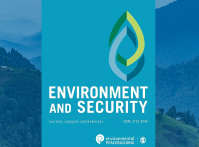-
“We Must Pay Attention”: Hurricanes Harvey and Irma Devastate the Caribbean, Threaten U.S. National Security, Reveal Infrastructure Weakness, Say Wilson Center Experts
September 15, 2017 By Saiyara Khan“This is not an island issue, this is not a Caribbean issue, this is an issue that is [also] critical for us,” says Roger-Mark De Souza, the Wilson Center’s director of population, environmental security, and resilience in a recent video interview. “For us in the United States we have to continue to recognize that we ourselves are also vulnerable.” De Souza remains hopeful about the possibility of rebuilding and rebounding in the face of devastation, but also presses the importance of generating response mechanisms which address environmental hazards before they manifest into disasters. “That means planning, it means investing in community mobilization mechanisms, it means thinking about ways we provide humanitarian assistance.”
Hurricanes Harvey and Irma shows that climate change is a direct threat to U.S. national security, argues Wilson Center Senior Fellow Sherri Goodman in a recent CNBC op-ed. New risk standards and investments in infrastructure need to be adopted in consideration of a “climate threatened-future.” Both civilian and military communities are especially crucial for planning for “the next event that will disrupt lives, safety, health, and infrastructure,” she writes. “While we cannot prevent future extreme weather events from occurring, we can do more to assess the risks of living in the new normal of climate-fueled disruptive weather and water events.”
More than 123.3 million U.S. citizens are threatened by rising sea-levels and surging storms in the nation’s coastal communities, argue De Souza and his coauthors Chris Field, Alice Hill, and Katherine Mach in The Hill. The country’s D+ rating on the 2017 infrastructure report card from the American Society of Civil Engineers reveals that the United States has failed to invest in resilient infrastructure construction and maintenance, and is “effectively throwing money into the ocean” by not addressing the imminent climate threats. The “impacts are occurring now and without dedicated attention, risk is becoming unmanageable,” De Souza et al. caution. “Spending the money upfront on resilience is more cost-effective than paying for post-disaster cleanup.”
In a one-minute video, De Souza listed three basic facts that should guide policy decisions about extreme weather events:
- These events will continue to happen and intensify.
- We must pay attention to these events.
- We must plan for these events, absorb their impacts, and rebuild stronger and better, “for our economy, for our infrastructure, and for our lives.”
Sources: CNBC, The Hill
Video Credit: Wilson Center NOW, Wilson Center TRENDING
 A Publication of the Stimson Center.
A Publication of the Stimson Center.






